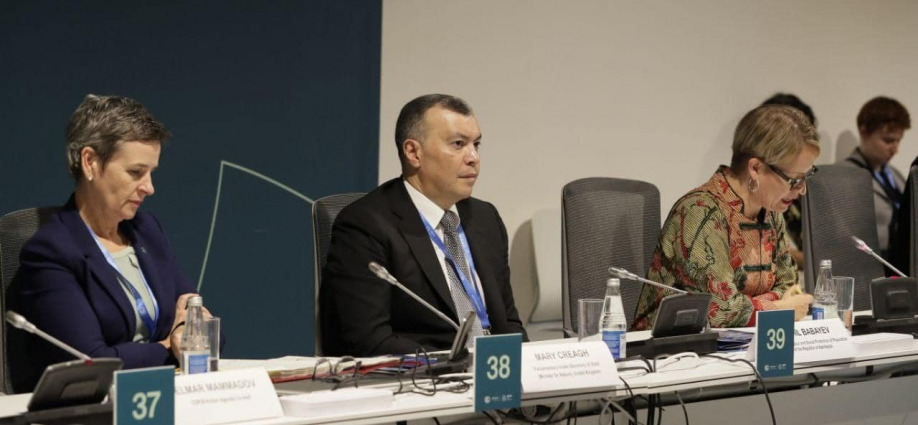A high-level roundtable on "Green Jobs and Skills" was organized within the framework of COP29

A high-level roundtable on the topic of "Green Jobs and Skills" was held within the framework of the 29th session of the Conference of the Parties (COP29) to the United Nations Framework Convention on Climate Change (UNFCCC). The event was attended by high-ranking officials from various countries and international organizations.
The roundtable, moderated by Mia Seppo, Assistant Director-General for Employment and Social Protection at the International Labour Organization (ILO), focused on issues such as investing in the development of skills for the current and future workforce to support a just transition to a green economy, promoting decent green jobs and the development of skills for these jobs, and exchanging best practices in this field.
Sahil Babayev, Minister of Labour and Social Protection of the Population of Azerbaijan, responded to the moderator's question regarding the efforts made in Azerbaijan to ensure that the workforce possesses the skills required for green industries.
The Minister stated that the transition to a green economy also requires the training of a skilled workforce in these areas. The rapid development of green technologies necessitates the continuous evolution of the required skills, and adapting our current education and vocational training systems to these changes is one of the main priorities. Like other countries aiming for a transition to a green economy, Azerbaijan is also working to equip its workforce with the new skills necessary for this transition. This process requires a workforce with technical expertise in areas such as engineering, renewable energy, environmental protection, digital technologies, and other related fields.
- Babayev also noted that, in response to the growing global demand for intensive vocational training and upskilling, the Ministry of Labour and Social Protection of the Population has prioritized this direction. He mentioned that the Ministry operates five regional vocational training centers, with several more such centers under construction. These centers offer training in green skills, such as the operation of renewable energy systems and equipment, the assembly of renewable energy installations, and the installation of wind turbine systems, aimed at unemployed individuals and job seekers.
The Minister noted that the scale of efforts to train a skilled workforce for green jobs in Karabakh and Eastern Zangezur has been steadily expanding. He emphasized that the training programs in these areas not only contribute to the development of the green economy but also create new employment opportunities for unemployed and job-seeking individuals. He also highlighted that the state employment policy prioritizes the provision of effective employment and decent work for young people, women, and persons with disabilities, with a number of incentive programs for employers being implemented to support the integration of vulnerable groups into the labor market.
At the roundtable, speakers included Mikhail Sarjveladze, Minister of Internally Displaced Persons, Labor, Health, and Social Affairs of Georgia; Mary Craig, Parliamentary Advisor to the Secretary of State for the United Kingdom; Shavar Siraj, Regional Vice President of the Workers' Federation of Pakistan; Sonya Janahi, Vice President for Asia at the International Organization of Employers and Representative of Bahrain's Chamber of Commerce and Industry; Shanti Jagannathan, Director of the Human and Social Development Sector Group at the Asian Development Bank; Azer Bayramov, Director-General of the Labour Centre of the Organization of Islamic Cooperation; Ingrid-Gabriela Hoven, Managing Director of the German Society for International Cooperation (GIZ); Nigar Mammadova, Member of the National Assembly; Angela Basović, State Secretary at the Ministry of Labour, Employment, and Social Dialogue of Montenegro; Adil Çalışkan, Deputy Minister of Family and Social Services of Turkiye, and others.
They responded to the moderator's questions and shared information about the efforts being made in their countries to develop workforce skills for a just transition to a green economy, as well as the goals ahead in this regard. The importance of cooperation and exchange of best practices in the development of green jobs and the skills required for these jobs was also emphasized. Elmar Mammadov, Co-chair of the Global Initiatives Group of the COP29 Action Agenda, highlighted the significance of the discussion on this timely topic.

















